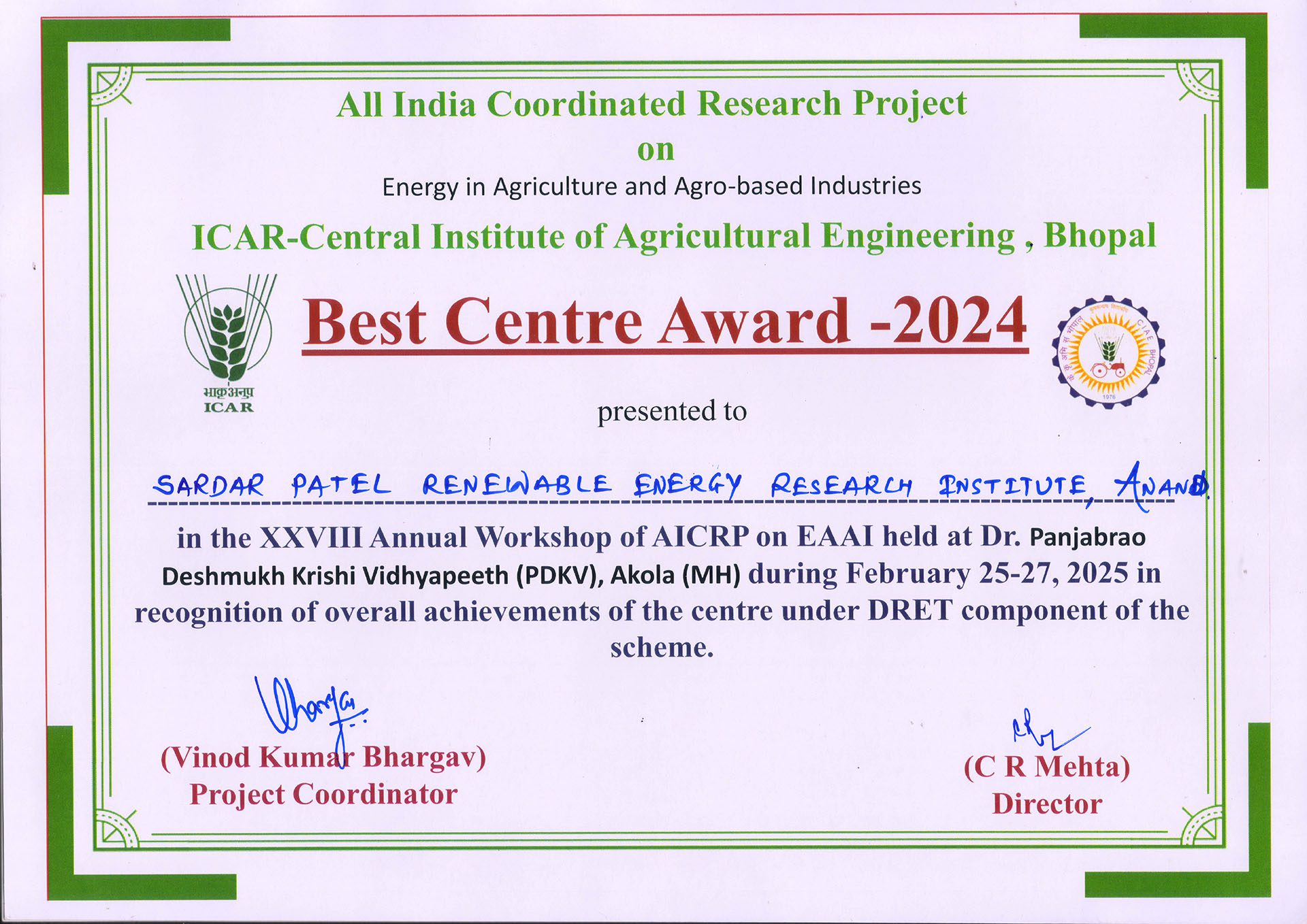

SPRERI received BEST CENTRE CERTIFICATE from ICAR for the scheme AICRP on EAAI for development of renewable energy technologies at National level among 18 contributing centers


Er. Shri Bhikhubhai
Er. Shri Bhikhubhai B. Patel got his school education from M U Patel Technical High School, Vallabh
Vidyanagar. He received his Bachelor of Engineering (Civil Engineering) degree from Birla Vishwakarma
Mahavidyalaya (Sardar Patel University), Vallabh Vidyanagar.
Er. Shri Bhikhubhai’s social contribution is quite noteworthy. He has been immensely contributing to
various social activities like Samuh Lagna, Awards and Scholarships to the bright students, innovations in
the field of farming, women empowerment, youth development, cultural activity centre, etc. He has been
the founder of the Youth Club in the village Bharoda. He has been serving as the president of the Bharoda
Village Education Trust for the last several years.
He is also the President of Sardar Patel Federation. He has served on senate and syndicate of Sardar Patel
University, Vallabh Vidyanagar for several years and has made valuable contributions there. He served as
member of the Governing Council of Charutar Vidya Mandal for many years. He served Vallabh Vidyanagar
Cooperative Bank Limited as member of Board of Directors for many years and since 2018, he has been
serving the Board as Chairman. As member and now as the Chairman he has been making impressive
contribution in the area of ethical banking.
Since February, 2018 Er. Shri Bhikhubhai Patel has been serving Charutar Vidya Mandal as Chairman, and
has realized many positive changes in its fifty institutions rendering education from KG to PG. His vision
of and ideal University has prompted him to solicit the status of State Private University named as
The CVM University approved by the Gujarat Government. Considering his vision and thoughts, the highest
body of Charutar Vidya Mandal, the sponsoring body of The CVM University has appointed him as the
President of The CVM University. He has been leading the CVM and the CVM University with vision and
strong personal values and ethics. And now he is the chairman of the board of management of SPRERI. His
philanthropic engagement has changed several lives and strengthened many organisations engaged in social
welfare.


Dr. Gaurav Mishra (Director)
With over 23 years of experience, Dr. Gaurav Mishra has demonstrated history of working in the renewables and environment industry. Skilled in Research, Energy Management, Sustainable Development, Biomass Energy, Solar Energy, and Renewable Energy. He has done Doctorate in Energy Science from Kyoto University, Japan. He is Expert Committee Member with various organizations like DST, BIS, etc. Prior to joining SPRERI, he worked as Head of R&D, SAR group of companies, and Director (Technical) in Solena-ABSi India Pvt Ltd. He was President and Executive body member of the Indian Scientists Association of Japan (Kyoto Chapter). His initial years were spent working in TERI as Research Associate, Associate Fellow, and Fellow.


Dr. Amrita Patel
Dr. Amrita Patel is the former Chairman of the National Dairy Development Board (NDDB). She also served on the board of WWF India, Indian Institute of Forest Management, Bhopal, and continues to be on the boards of Society for Promotion of Wastelands Development, New Delhi, and Foundation for Ecological Security, Anand. She is currently the Trustee of Charotar Aarogya Mandal (CAM), Karamsad. She was conferred the Padma Bhushan by the Government of India for her contribution to the dairy and animal husbandry industries, and the Indira Gandhi Paryavaran Puraskar by the Ministry of Environment and Forests for her significant contribution to the Environment. She featured in the list of Top Business Women of the Year (Business Today) consecutively for five years and topped the list in 2008. Dr. Patel is currently serving as the Chairman of SPRERI and has led the institute to become a renowned organization in the field of Renewable Energy.


Mr. Sydney V Lobo
Over 25 years of in-depth experience in the area of Sustainability, Clean Energy and Environmental Management, in the Hydro-carbon and Power industries. Seen as an industry expert in assessing techno-economic viability of diverse technologies across the globe, interfacing with eminent national and international institutions. The ability to manage multiple stakeholders and lead from the front, along with personal qualities of tenacity and focus, have resulted in filing of 3 Patents, publishing of multiple research papers and currently working with national an international companies and start-ups on next generation technologies and ESG.


Datta Madamwar, Ph.D
Professor Datta Madamwar is currently working as Scientific Advisor at Charotar University of Science & Technology, Changa, Anand, Gujarat. He obtained his Ph.D from BITS, Pilani. He is a former Professor and Head, Department of Biosciences and former Dean, Faculty of Science at Sardar Patel University, Vallabh Vidyanagar. He worked as a Post-Doctoral Fellow at TIFR, Mumbai, University of Frankfurt and University of Konstanz and also served at BITS, Pilani. Professor Madamwar is a Microbial Biotechnologist with diverse research interest. His main research focus is on Microbial Bioremediation, Environmental Biotechnology, Non-aqueous Enzymology, and Cyanobacterial Biotechnology. He is a recipient of European Commission Visiting Scientist Fellowship, Visiting Professorship at Swiss Federal Institute of Technology, Lausanne, Switzerland, Visiting Professorship at University of Blaise Pascal, Clermont-Ferrand, France, Life Time Achievement Award of BRSI for the year 2019, Life Time Microbiology Devotion Award by Microbiologists Society (India) for the year 2021, Fellow of International Bioprocessing Association, Fellow of Biotech Research Society of India, Fellow of Association of Microbiologists of India, Fellow of Association of Biotechnology and Pharmacy and Gujarat Science Academy, BHU-Centennial Award of BRSI and member of several academic bodies, member of Task Force, Expert Committee of various agencies such as DBT, DST, GSBTM etc. He is also a member of editorial board of several national and international journals. Professor Madamwar has published more than 285 research papers, several book chapters and one provisional American Patent to his credit. He is having an h-index of 67 and i-10 index of 206 with more than 14000 citations. Prof. Datta Madamwar is listed in World Ranking of Top 2% Scientists.

